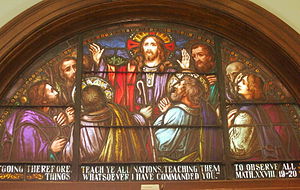A Theology of Work – Part 3
Then Jesus came to them and said, “All authority in heaven and on earth has been given to me. Therefore go and make disciples of all nations, baptizing them in the name of the Father and of the Son and of the Holy Spirit, and teaching them to obey everything I have commanded you. And surely I am with you always, to the very end of the age.” (Matthew 28:18-20)

English: The Great Commission, at the Cathedral Parish of Saint Patrick in El Paso (Photo credit: Wikipedia)
This passage has been dubbed The Great Commission. Jesus has commanded his church to complete the work of making disciples that he began. If the Cultural Mandate (“Be fruitful and increase in number; fill the earth and subdue it.”) gives us the nature of our work as stewards of the King doing His work at His direction, and if the Greatest Commandments (“Love the Lord your God; love your neighbor as yourself.”) give us our motive for working for God, then the Great Commission gives us our goal in our work.
It should be obvious that the Great Commission gives us our goal for all aspects of our lives. But as we apply it to work it leads to these conclusions:
- The greatest good my work can accomplish is to help lead someone to Christ
This is not to say that the only work I should do is be an evangelist. As we have already seen, doing our work as a grocer, a police officer, a seamstress, or any other profession that is morally acceptable brings credit to God and benefit to mankind. When we do our work as if working for God (which we really are) we show the beauty of God’s love for humanity and draw people to His goodness. By participating in this honorable cultural mandate we gain respect that aids us when we speak the words of the gospel. It is one way of showing that we practice what we preach…the love of God.
The good of contributing to our world by helping flourish is a worthy goal in and of itself. But an even greater goal is to help someone flourish spiritually with their Creator. So though our work is done as part of our subduing the earth, it is also done with an eye to securing converts to the faith. This, after all, is clearly God’s greatest desire for all His people.
- There are some believers whose main work should be helping lead someone to Christ
There is a place for “full time service” to the Lord. Even though all of us are in full time service to the Lord if we are Christians, some of us have gifts of leadership and equipping that can be more fully devoted to the task of preparing God’s people to accomplish the Great Commission if we are financially supported by other believers (1 Timothy 5:17). It is strategically wise to install some as pastors and evangelists in order to give them more freedom to equip the church for this task.
Following whatever vocational calling we have in accord with our gifts and talents and desires will give each of us unique insights into life and how to reach others for Christ. Someone who speaks the language of accounting might be better able to reach a fellow accountant. Someone who has experienced the unique strain of an emergency medical technician might be better able to reach a fellow EMT. Someone who herds sheep might be more in tune to God’s spiritual shepherding of people. Everything we know and do can contribute to our effectiveness as individuals and as the church combined for drawing our world to the Savior.
For further reading:
Is There a Distinctively “Christian” Way to Be a Bus Driver?
About the Author
Randall Johnson
A full-time pastor since 1979, Randall originally graduated from Dallas Theological Seminary (ThM) in 1979 and from Reformed Theological Seminary (DMin) in 1998. He is married with four grown children and a pile of epic grandchildren.

